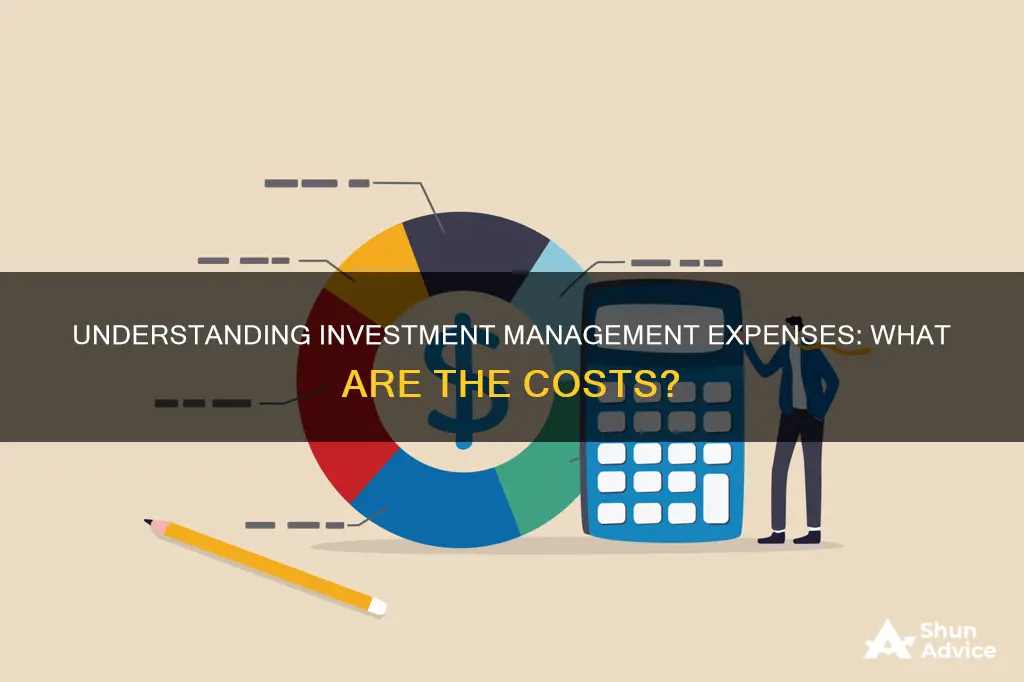
Investment management expenses are fees charged by investment managers for their services. These fees are intended to compensate investment managers for their time and expertise in selecting stocks and managing a portfolio. Management fees are usually based on a percentage of the assets under management (AUM) and can range from 0.10% to over 2% of the AUM. These fees are an essential component of the cost of investing in a mutual fund and are automatically deducted from the fund.
| Characteristics | Values |
|---|---|
| Definition | A management fee is a charge levied by an investment manager for overseeing an investment fund. |
| Purpose | To compensate managers for their time and expertise in selecting stocks and managing the portfolio. |
| Components | Management fee, trailing commission, operating expenses, taxes, administrative costs, investor relations expenses. |
| Calculation | Typically a percentage of assets under management (AUM). Can range from 0.10% to over 2% of AUM. |
| Impact on Returns | Management fees directly affect returns by reducing the fund's overall earnings. |
| Comparison | MER is often used to compare the cost-effectiveness of different funds as it includes all relevant expenses. |
| Active vs. Passive Funds | Actively-managed funds generally have higher management fees than passively-managed funds. |
| Hedge Fund Fees | "Two and twenty" structure: 2% of total asset value and 20% of profits. |
| Additional Fees | Penalty fees, inactivity fees, maintenance fees, 12b-1 fees (for marketing and shareholder services). |
| Tax Implications | Management fees and expense ratios do not have direct tax implications but lower returns due to higher fees affect taxable income. |
| Importance for Investors | Understanding management fees and MER is crucial for making informed investment decisions and portfolio management. |
| Negotiation | Management fees are generally not negotiable for individual investors but can be negotiated by institutional investors and high-net-worth individuals. |
What You'll Learn
- Interest on money borrowed to invest
- Investment interest expenses are deductible in some circumstances
- Investment interest expenses are limited to the amount of investment income received
- Investment interest expenses cannot be claimed on passive ventures
- Investment interest expenses can be carried forward to the next year

Interest on money borrowed to invest
Investment management expenses refer to any interest charged for a loan related to an investment. One example of this type of expense is the interest on money borrowed to invest. This is the interest paid on money borrowed to purchase investments or securities. This can include margin interest used to leverage securities in a brokerage account and interest on a loan used to buy property held for investment.
The amount of the tax deduction for interest on money borrowed to invest is limited to the amount of taxable investment income earned in the same year. If the investment does not generate enough income to cover the interest expense, the "disallowed" amount can be carried forward into the next year's tax filing.
It is important to note that the interest on money borrowed to invest is only deductible if the investment generates income such as dividends or interest. Capital gains are not considered income for the purposes of this deduction. Therefore, if an individual borrows money to invest only in shares that do not pay dividends and relies solely on capital gains to make money, the interest on the loan is not deductible.
To claim the deduction for interest on money borrowed to invest, individuals must itemize their deductions. In the United States, this interest goes on Schedule A, under "Interest You Paid," and Form 4952 may also need to be filed. In Canada, this interest is deductible on Line 22100 of the Income Tax and Benefit Return.
Making a Beneficiary Claim: MFS Investment Management Guide
You may want to see also

Investment interest expenses are deductible in some circumstances
Investment interest expenses refer to any interest charged on loans related to investments, such as margin loan interest or interest on loans for investment properties. These expenses are tax-deductible in certain circumstances, but there are limitations.
Firstly, it's important to understand the difference between active and passive investments. Active investments are those in which the taxpayer materially participates, while passive investments are those that the taxpayer owns but does not actively manage. Investment interest expenses are deductible for active investments but not for passive ones.
For example, if a taxpayer takes out a loan to invest in a business they own but do not actively manage, the interest on that loan would not qualify as a deductible investment interest expense. Similarly, if the loan is used to acquire a rental property, the interest expense cannot be claimed as a deduction.
Another consideration is the type of income generated by the investment. Investment interest expenses are deductible against ordinary income, such as dividends and interest income. However, they cannot be deducted against income that is taxed at lower, long-term capital gains tax rates or tax-exempt income, such as municipal bond interest.
The amount of investment interest expense that can be deducted is also limited. It cannot be larger than the net investment income earned in that year. Any excess can be carried forward and potentially used to reduce taxes in future years.
Additionally, there are special considerations for certain types of investments, such as oil and gas working interests. If a taxpayer does not materially participate in these working interests and generates a net loss, they must reduce their net investment income by that amount. However, they may benefit by taking steps to meet the material participation standard, so the net loss does not reduce their allowable investment interest expense.
In summary, while investment interest expenses are deductible in some circumstances, it is important to carefully consider the specifics of the investment and applicable tax regulations to determine eligibility for deductions.
Hiring an Investment Manager: Is It Worth the Cost?
You may want to see also

Investment interest expenses are limited to the amount of investment income received
Investment management expenses refer to the fees and costs associated with managing and operating an investment fund. These expenses cover a range of services, such as investment decisions, research, administrative tasks, and marketing. One of the significant components of investment management expenses is the investment interest expense.
An investment interest expense refers to the interest charged on a loan taken out to purchase investments or securities. This includes margin loan interest used to leverage securities in a brokerage account or interest on a loan used to buy investment property. For example, if an individual takes out a loan against their home equity to invest in stocks, the interest on that loan is considered an investment interest expense.
It is important to note that investment interest expenses are tax-deductible under certain conditions. However, there are limitations to how much can be deducted. One key restriction is that the investment interest expense deduction is limited to the amount of investment income received, such as dividends and interest. This means that the deductible amount cannot exceed the investment income earned in the same year. If the interest expense exceeds the investment income, the excess amount can be carried forward and deducted in the following year's tax filing.
Additionally, investment interest expenses are not applicable to passive ventures, such as investing in a business that the taxpayer owns but does not actively manage. In such cases, the interest on the loan would not qualify as an investment interest expense deduction.
It is crucial for investors to understand the distinction between different types of expenses and their tax implications to make informed decisions and maximize their tax benefits.
Understanding Portfolio Investment Entities in New Zealand
You may want to see also

Investment interest expenses cannot be claimed on passive ventures
Investment interest expenses refer to the interest paid on money borrowed to invest in assets that produce taxable investment income or appreciate in value, allowing you to sell at a future gain. The interest charged for a loan related to an investment, such as margin loan interest or interest on an investment property, is referred to as an investment interest expense.
An investment interest expense is tax-deductible in certain circumstances. However, it is important to note that investment interest expenses cannot be claimed on passive ventures. A passive venture is an investment in a business that the taxpayer owns but does not actively manage. In other words, it is a business or trade in which the taxpayer holds an ownership interest but does not materially participate. For example, if a taxpayer borrows money to buy a stake in a friend's business but does not actively work in or manage that business, the interest on that loan would not qualify as an investment interest expense.
Additionally, if a loan is taken out to acquire a rental property, the interest on that loan also cannot be claimed as an investment interest expense. According to the tax code, renting out a house or another property is typically deemed a passive activity.
It is worth noting that there are various limitations on the deductions that can be claimed for investment interest expenses. For instance, the deduction may not be claimed if the loan proceeds were used to purchase a property that generates nontaxable income, such as tax-exempt bonds. Furthermore, the deduction for investment interest expenses in a given year cannot be larger than the investment income earned in that year. However, any excess amount can be carried forward and claimed in the next year's tax filing.
Understanding Your Financial Investment Portfolio Better
You may want to see also

Investment interest expenses can be carried forward to the next year
Investment interest expenses refer to the interest charged on loans related to investments. For example, if you take out a loan against your home equity and use the money to buy stocks, the interest on that loan is considered an investment interest expense.
Investment interest expenses are tax-deductible in certain circumstances. However, there are limitations on the deductions that can be claimed. For instance, the deduction may not be claimed if the proceeds from the loan went towards a property that generates non-taxable income, such as tax-exempt bonds. Another restriction is that the deduction on investment interest cannot be larger than the investment income earned that year.
If you are unable to claim the full amount of your investment interest expenses as a deduction in the current tax year, you can carry forward the "disallowed" amount and deduct it in the following year's tax filing. This means that if your investment interest expenses exceed your investment income in a given year, you can still benefit from the tax deduction by claiming it in the subsequent year.
It is important to note that interest incurred from a "passive activity" investment generally does not qualify for the investment interest deduction. A passive activity is typically defined as a business or trade in which you hold an ownership interest but do not actively participate in its management.
Investing vs Saving: Understanding the Key Differences
You may want to see also
Frequently asked questions
A management fee is a charge levied by an investment manager for overseeing and managing an investment fund. The fee is intended to compensate managers for their time and expertise in selecting stocks and managing the portfolio. It is usually calculated as a percentage of the fund's average assets under management (AUM).
Management fees include the cost of paying the managers, investor relations expenses, and administrative costs.
Management fees typically range from 0.10% to more than 2% of the AUM. The fee structure depends on the investment method used by the fund manager, with actively managed funds generally having higher management fees than passively managed funds.
While related, the management fee and MER refer to different aspects of fund expenses. The management fee is specifically charged for asset management services and is included in the MER, along with other expenses such as administrative, operational, legal, and marketing costs.
Higher investment management fees can reduce the long-term growth of your investments. Over time, even a small difference in expense ratios can lead to substantial differences in investment returns. Therefore, it is essential to consider these fees when making investment decisions.







